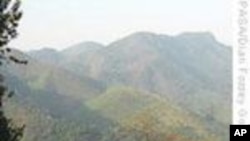<!-- IMAGE -->The Congo Basin forest is the second largest contiguous moist tropical forest in the world. Stretching throughout Central Africa, the forest covers an area of approximately 180 million hectares from the Atlantic Ocean’s Gulf of Guinea to the mountains of the Albertine Rift and includes some 60 million inhabitants. The forest, therefore, is of local, regional, and global significance.
Throughout this vast ecosystem, the United States works with an array of governments, local communities, non-governmental organizations, and businesses involved in the Congo Basin Forest Partnership to improve the management of the forest.
The Central African Regional Program for the Environment, a program of the United States Agency for International Development (USAID), cofinances the United States' Congo Basin activities, working in nine countries in Central Africa with organizations such as Conservation International, the African Wildlife Foundation, the Wildlife Conservation Society, the World Wildlife Fund and others, to achieve their mission on the ground.
John Flynn, director of CARPE, lives in the Democratic Republic of the Congo and travels throughout the region, often by small plane, motor bike, and dugout canoe to do his job. He observes first-hand how partner organizations are working to help the forest and its people:
"Some of them are actually working with the logging companies to ensure and assist them in making the best possible logging practices: to ensure that the wildlife are not being harmed, to ensure that local communities are not being adversely affected. Others are working directly with the various governments and trying to help their Ministries of Forestry or their Departments of Forests and Environment, to improve their ability to manage the forest itself. And others are working directly right with the local communities, including even the semi-nomadic peoples such as the Pygmies [to] actually help improve their daily livelihoods."
Mr. Flynn notes that the communities of the Congo Basin depend on the forest directly for survival. Improved and nondestructive methods of living off the forest resources, he says, will help create a better quality of life today and ensure that the forest is there for future generations.
Throughout this vast ecosystem, the United States works with an array of governments, local communities, non-governmental organizations, and businesses involved in the Congo Basin Forest Partnership to improve the management of the forest.
The Central African Regional Program for the Environment, a program of the United States Agency for International Development (USAID), cofinances the United States' Congo Basin activities, working in nine countries in Central Africa with organizations such as Conservation International, the African Wildlife Foundation, the Wildlife Conservation Society, the World Wildlife Fund and others, to achieve their mission on the ground.
John Flynn, director of CARPE, lives in the Democratic Republic of the Congo and travels throughout the region, often by small plane, motor bike, and dugout canoe to do his job. He observes first-hand how partner organizations are working to help the forest and its people:
"Some of them are actually working with the logging companies to ensure and assist them in making the best possible logging practices: to ensure that the wildlife are not being harmed, to ensure that local communities are not being adversely affected. Others are working directly with the various governments and trying to help their Ministries of Forestry or their Departments of Forests and Environment, to improve their ability to manage the forest itself. And others are working directly right with the local communities, including even the semi-nomadic peoples such as the Pygmies [to] actually help improve their daily livelihoods."
Mr. Flynn notes that the communities of the Congo Basin depend on the forest directly for survival. Improved and nondestructive methods of living off the forest resources, he says, will help create a better quality of life today and ensure that the forest is there for future generations.




